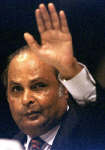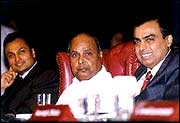
Dhirajlal Hirachand Ambani is not just the usual rags-to-riches story. He will be remembered as the one who rewrote Indian corporate history and built a truly global corporate group.
Popularly known as Dhirubhai, the 69-year-old Ambani Sr., changed the rules of the game in the industry in an era when the private sector was hampered by the licence regime. In the process, he attracted criticism that he did not always play fair.
There is also the story of how the Ambanis blocked publication of a biography titled The Polyester Prince written by a foreign writer by threatening legal action for anything they perceived as defamatory in the book.
Ambani's huge success, however, dwarfed the controversies that surrounded him.
Ambani's huge success, however, dwarfed the controversies that surrounded him.
A matriculate, he started his career as a worker at a Shell service station in Aden (Yemen) but returned to the country to build an empire that now boasts of a net worth of over Rs 300 billion with a net profit of over Rs 2,800 crore.
Now employing a workforce of 85,000, the group's Rs 25,000 crore integrated Jamnagar refinery complex in Gujarat houses the world's largest greenfield project with a capacity to refine 27 million tonnes of crude every year.
Now employing a workforce of 85,000, the group's Rs 25,000 crore integrated Jamnagar refinery complex in Gujarat houses the world's largest greenfield project with a capacity to refine 27 million tonnes of crude every year.
Armed with a matriculation certificate, he went to Aden only to return with a big idea of building a petroleum company.
He returned to India in 1958 with Rs 50,000 and set up a textile trading company.
Starting from a scratch in 1966, Ambani and his two US-educated sons - Mukesh and Anil -- have built brick by brick an empire that has outstripped older venerable groups like the Tatas and the Birlas.
Ambani is also credited with shaping India's equity culture, attracting millions of retail investors in a market till then dominated by financial institutions.
More than the fact that he built India's largest private sector company from a scratch, Ambani will be remembered for revolutionising capital markets. From nothing, he generated billions of rupees in wealth for those who put their trust in his companies.
Over a period of two decades, Ambani's millions of investors lifted him from being owners of a fledgeling Rs 2-3 million firm in the 1970s to a situation, according to last count, the total revenues were more than Rs 600 billion.
Over a period of two decades, Ambani's millions of investors lifted him from being owners of a fledgeling Rs 2-3 million firm in the 1970s to a situation, according to last count, the total revenues were more than Rs 600 billion.


Backward and forward 'integration' became the buzzwords in the Ambani group's strategy of growth. Today, the group straddles every link in the petroleum and petrochemicals value chain, beginning with oil and gas production to refining, to making intermediates and finished products like fabrics.
Ambani is also credited with being the man whose efforts helped create an 'equity cult' in the Indian capital market.
Ambani is also credited with being the man whose efforts helped create an 'equity cult' in the Indian capital market.
With innovative instruments like the convertible debenture, Reliance quickly became a darling of the stock market in the 1980s. Today, the group has close to five million individual shareholders.
In 1992, Reliance became the first Indian company to raise money in global markets, its high credit-taking in international markets limited only by India's sovereign rating.
With the meteoric rise of the Ambanis came formidable power and clout. What distinguishes Reliance's growth is that much of it came not during the post-liberalisation 1990s but in the days of the 'License Raj' when there were stifling controls on the industry.
Dhirubhai managed to get his way and created his empire with remarkable ease, a way his business rivals could not digest easily. They accuse the group of subverting the system in its penchant for growth.
Critics accuse the group of resorting to all tricks of the trade and breaking all rules of the game. The corridors of power in Delhi and elsewhere are replete with stories of what the Ambani influence could do to the careers of politicians and bureaucrats.
Every Cabinet and bureaucratic reshuffle spurred a string of such stories. But the Ambanis were not bothered about these reports and ascribe such writings to the campaign by rivals inspired by jealousy.
Every Cabinet and bureaucratic reshuffle spurred a string of such stories. But the Ambanis were not bothered about these reports and ascribe such writings to the campaign by rivals inspired by jealousy.
In his relentless run to the pinnacle, Dhirubhai became the highest-paid chief executive officer with a salary at Rs 88.5 million leaving Wipro's Azim Premji far behind at Rs 42 million. Both are among the world's top 500 billionaires.
In the realm of sports, where intrigue, fascination, and intimidation intermingle, the quest for live-streaming platforms to enhance our viewing experiences takes center stage. As dedicated fans, we understand the desire to push the boundaries of our love for the game. Enter VIPBox, a renowned free live-streaming platform that captivates users with its diverse array of interesting games. However, for those seeking new avenues to elevate their sporting enthusiasm, exploring alternative platforms can bring a fresh wave of excitement. Luckily, there are several options available that cater to our voracious appetite for live sports coverage. With their professional-grade streaming capabilities and robust content libraries, these offer enthusiasts a wide range of thrilling matches, championships, and events to satiate their sporting cravings. Embracing these alternatives ensures that users can continue their quest for next-level spectating without missing a beat.
ReplyDelete